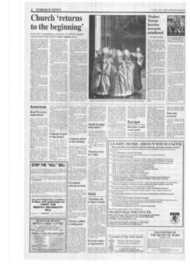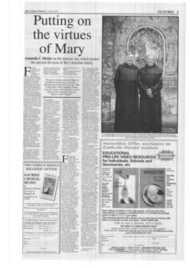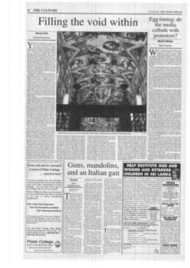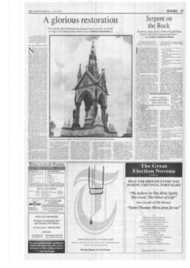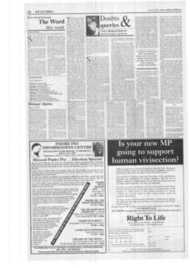Page 2, 1st June 2001
Page 2
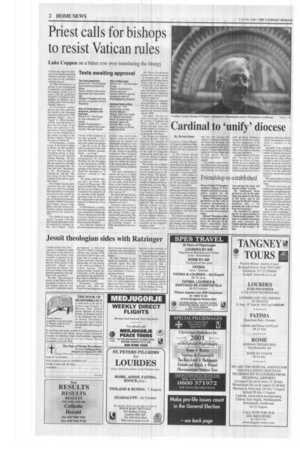
Report an error
Noticed an error on this page?If you've noticed an error in this article please click here to report it.
Tags
Share
Related articles
Cardinal Calls For Truce Over Icel
Anger As Rome Recalls Icel Psalter
`new' Version Of Creed Set For Approval
Vatican Ponders Future Of Unrepentant Translation Body
General Instruction Ready By End Of The Year
Priest calls for bishops to resist Vatican rules
Luke Coppen on a bitter row over translating the liturgy Texts awaiting approval
A PRIEST has urged the bishops of the English-speaking world to resist the Vatican's new rules on the translation of liturgical texts.
Fr John Fitzsimmons, an advisor to the International Commission on English in the Liturgy (ICEL) for 15 years, said the guidelines should be "consigned to the
dustbin of history" in a scathing article in the Scottish Catholic Observer.
Fr Fitzsimmons claimed that the new rules, published last month in the document Liturgiam authenticam ("The authentic liturgy"), were an "insult" to fellow members of ICEL who had chosen "to give the best years of our lives and expertise to the provision of good English texts for the celebration of the public worship of the Roman Catholic Church in the spirit of Vatican II".
Fr Fitzsinunons, a former rector of the Scots College in Rome, hit the headlines last year when he made an outspoken attack on Pope John Paul II and Cardinal Thomas Winning. He was forced to issue an apology after he claimed in a Scottish Sunday newspaper that the Pope had been "detrimental to the development of Catholicism" and that "the best thing for the Church would be to die and rise again like Christ".
The Erskine-based priest criticised the new Vatican rules hist week for insisting that translations of liturgical texts from Latin should be "as literal as possible" and that all Scriptural quotations should be faithful to the Latin Neo-Vulgate version of the Bible. a revised version of St Jerome's classic translation approved by the Vatican in 1979.
"For a Biblical scholar like myself," he wrote, "to be told that textual difficulties must be resolved by reference to the Neo-Vulgate Latin The Sacramentary What is it?: The liturgical book used by priests at Mass Status: Sent to Rome for approval over two years ago
Verdict: Probably will not
get the recognitio without
revisions
Rite of Ordination of deacons, priests and bishops What is it?: The liturgy for the ordination of clergy Status: Presented to Rome in March this year Verdict: Not yet known version of the Scriptures is not only an insult — it is a joke. Pius XII will be revolving in his marble sarcophagus — after all, it was he who told us to get back to the original texts, Hebrew, Aramaic, Greek — not Latin."
He challenged the Vatican Congregation for Divine Worship and the Discipline of the Sacraments (CDW) over its insistence that the opening of the Nicene Creed should be translated as "I believe", instead of "We believe".
"No matter what the Vatican says," he wrote, "the Council of Nicaea said: 'We believe in One God', Further, the text we use at Mass is an ecumenical text agreed by all the churches of the Englishspeaking world. For those in the congregation to demand a change is nothing short of an affront."
Fr Fitzsimmons, a consultor to the congregation for 10 years, questioned whether the Vatican department had the necessary expertise to set out guidelines on the translation from Latin into English.
"It is, after all, a matter of personal experience that most Rite of Marriage What it is?: The marriage liturgy Status: Submitted to Rome last year
Verdict: Will not get the recognitio without thoroughgoing revision
General Instruction
What it is?: The introduction to the Roman Missal Status: ICEL has made an official translation, which is awaiting the bishops approval Verdict: May not be ready to send to Rome until mid-2002 of those who work in the Vatican could not handle a decent pair of sentences in (intelligible) English to save their souls. Yet they have the nerve to dictate to the bishops of the English-speaking world how their liturgical texts are to be composed," he wrote, adding that the central issue was whether the Vatican or the bishops had the responsibility for making liturgical translations.
"This latest Instruction is merely the last in a whole series of such effusions. They all have this in common: they are not really about God or Jesus or the Church or religion in any meaningful sense. They are about power and who exercises it."
He added that the Instruction could be withdrawn if the English-speaking bishops refused to act on it.
Liturgiam authenticam is likely to be at the top of the agenda when the 11 bishops who belong to ICEL's episcopal board meet in July. The meeting, to be held in Washington, DC, will consider the far-reaching changes to ICEL demanded by the document. The Vatican has given the bishops five years to submit "an integral plan" on the preparation of liturgical translations and the revision of existing ones to the Vatican.
It has also given them the same time span to prepare a directory of texts of liturgical hymns and to submit it to the CDW for approval.
Fr Fitzsimmons' comments were described as "unhelpful" this week by a priest who has closely followed the negotiations between ICEL and the CDW.
The priest, who did not wish to be named, said that the bishops of England and Wales could not simply ignore the new rules and would instead be forced to "re-examine their position" on liturgical translations.
The bishops are currently awaiting Rome's seal of approval on a number of important liturgical documents (see box). Some of them will have to be revised in the light of Liturgiam authenticam before they are given the official recognitio — a process which could take several years.
The bishops face a further headache over an important document known as the General Instruction of the Roman Missal. The Instruction, released by the Vatican on July 28, 2000, made a number of significant recommendations on how Mass should be celebrated. The document was translated from Latin to English by ICEL and sent to the 26 bishops' conferences of the English-speaking world for approval. The Instruction, however, is likely to come into effect in the next few weeks when the Vatican publishes the third edition of the Latin Roman Missal — even though there is no officially approved transitLion available in the Englishspeaking world.
Editorial comment — p7
blog comments powered by Disqus





